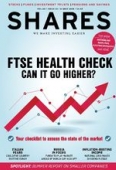Archived article
Please note that tax, investment, pension and ISA rules can change and the information and any views contained in this article may now be inaccurate.
What Apple's latest earnings release can tell you about quality companies

Shares in the company behind the iPhone and iPad, US consumer electronics giant Apple, are back in fashion after its quarterly earnings release on 1 May. The shares are up nearly 15% since the update.
This revealed that in the three months to 31 March, the company’s services division, encompassing its app store, AppleCare, ApplePay plus more, saw revenue leap 31% to $9.2bn.
This helps counter arguments that the saturation of the smartphone market means Apple can no longer offer growth.
And this growth is highly profitable. Although Apple doesn’t reveal the margin performance of individual divisions most observers reckon the services arm delivers margins in excess of 50%.
A lesson investors can draw from this, which is applicable to other businesses, is the benefit of having a large installed base from which you can derive recurring ancillary revenue.
In Apple’s case the installed base is principally represented by the more than a billion iPhones it has sold. But an installed base could be anything from kit in a piece of machinery or a popular software programme.
SPARES AND REPAIRS
Typically the company which installed the kit or software will agree an aftermarket contract to provide spares and repairs or software upgrades to its customer.
This provides lots of repeat revenue and offers the market good visibility on future profit and cash flow. This visibility, plus the big returns associated with this type of activity, is often rewarded with a high share price rating.
It is one of the reasons we are confident in Warren East’s turnaround project at engineering firm Rolls-Royce (RR.). The former ARM-boss took over as chief executive in 2015 after a troubled spell which saw a series of profit warnings and a damaging corruption scandal.
Rolls designs and manufactures jet engines and one in two passenger planes are powered by its engines. These are critical components in an industry where safety is paramount.
As such, new parts and repair work would be extremely difficult to source elsewhere, giving the company both strong visibility on future revenue and significant pricing power.
But, as Rolls’ difficult period between 2013 and 2016 shows, these advantages are no guarantee of success and can be undermined by poor management or external factors.
Important information:
These articles are provided by Shares magazine which is published by AJ Bell Media, a part of AJ Bell. Shares is not written by AJ Bell.
Shares is provided for your general information and use and is not a personal recommendation to invest. It is not intended to be relied upon by you in making or not making any investment decisions. The investments referred to in these articles will not be suitable for all investors. If in doubt please seek appropriate independent financial advice.
Investors acting on the information in these articles do so at their own risk and AJ Bell Media and its staff do not accept liability for losses suffered by investors as a result of their investment decisions.

 magazine
magazine









